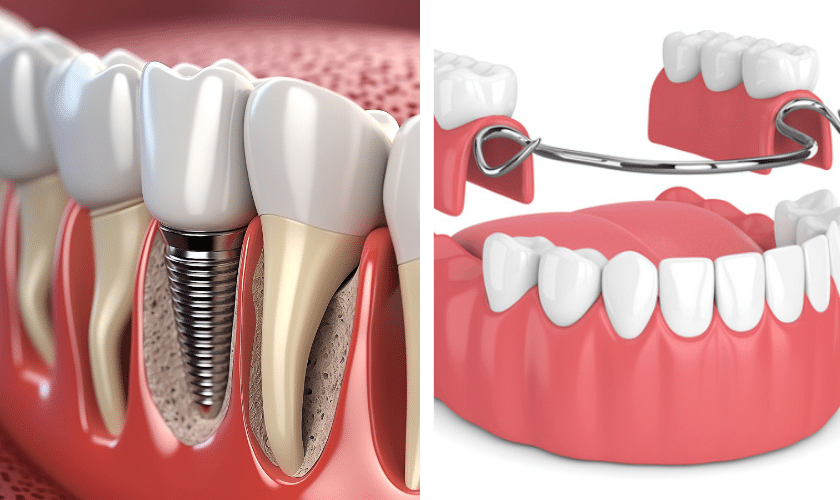Introduction
Differences Between Dental Implants and Dentures

Differences Between Dental Implants and Dentures
Introduction:
When individuals lose one or several teeth, prompt consideration for restoration becomes essential. Leaving a gap in the jaw can lead to gum and bone tissue deterioration or cause adjacent teeth to shift, resulting in irregular tooth alignment. To address these issues, dental prosthetic methods such as implants and dentures can be utilized. Let's explore the differences between dental implants and dentures in terms of structure, functionality, and appearance.
Introduction to Dental Implants:
Dental implants come in both fixed and removable forms. Implants require fixtures and bases to be placed within the jawbone, ensuring the prosthetic remains firmly and permanently in place. After securing the fixture within the jawbone, a crown and a covering are placed over the implant. Implants can be used to replace a single missing tooth or multiple missing teeth.
Introduction to Dentures:
In contrast to dental implants, dentures do not require surgery or incisions in the gums for placement. Dentures have gum-like bases that are designed to fit the upper and lower jaws through molding.
Difference in Procedure:
Implants are secured within the jawbone using titanium fixtures, requiring surgical placement. Conversely, dentures are placed over the gums and do not involve surgical procedures. Therefore, one significant difference lies in the strength of implants compared to dentures. Implants require surgery for the placement of the base, while dentures are simply fitted onto the gum line.
Lifespan:
The longevity and durability of implants and dentures also differ. Implants, with proper maintenance and correct implementation, can last up to 20 years. In contrast, dentures typically have a lifespan of 7 to 10 years.
In summary, while both dental implants and dentures offer solutions for missing teeth, they differ significantly in terms of procedure, strength, and lifespan. Implants provide a more permanent and durable solution, requiring surgical placement within the jawbone, while dentures are non-invasive and have a shorter lifespan. Consulting with a dental professional can help determine the most suitable option based on individual needs and circumstances.
Differences Between Dental Implants and Dentures in Appearance
Appearance of Dental Implants:
Dental implants are designed to mimic the natural structure of teeth, as they are anchored into the jawbone like roots. This design provides better harmony with surrounding teeth, offering a more natural and uniform appearance. Therefore, if you seek to restore missing teeth in a natural and aesthetically pleasing manner, dental implants would be preferable over dentures. However, it's crucial to consider your individual oral health conditions and needs when choosing between implants and dentures.
Difference in Treatment Duration:
Implants require a longer treatment duration compared to dentures due to the surgical process involved. The healing of gum tissue and integration of the implant fixture into the jawbone may take several months before the final crown and covering are placed over the implant. Temporary or immediate covers can be used during this period to maintain appearance. In contrast, the entire process of creating dentures can typically be completed within a week.
Difference in Application:
One of the advantages of dental implants is their ability to ensure the health of the jawbone and gum tissue, as they integrate into the bone structure similar to natural teeth roots. This prevents bone and tissue deterioration over time, a benefit not offered by dentures, which solely rest on the gum line. Additionally, because implant fixtures function like natural tooth roots, patients may not experience denture slippage during eating or speaking, which can occur with conventional dentures.
Difference in Maintenance:
Implants closely resemble natural teeth and require similar care, including brushing and flossing. Dentures, on the other hand, can be removed from the mouth for cleaning, making them more accessible for maintenance. They can also be soaked in a denture-cleaning solution overnight.
Suitable Candidates for Implants and Dentures:
For dental implant placement, consultation with a specialized dentist is necessary to assess your overall health status and suitability for the procedure. Conditions such as osteoporosis, diabetes, or prior radiation therapy may pose challenges for implant placement, making dentures a more suitable option for some individuals.
Difference in Cost:
The disparity in cost between dental implants and dentures is another consideration. Due to the complexity of implant placement and their superior benefits, the cost of dental implants is generally higher than that of dentures.
Conclusion:
In conclusion, while both dental implants and dentures offer solutions for missing teeth, they differ significantly in appearance, treatment duration, application, maintenance, suitability for candidates, and cost. Consulting with a qualified dentist is essential to determine the most suitable option that aligns with your individual needs and preferences.
